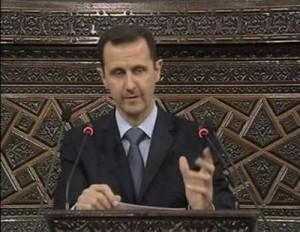 Syrian President Bashar Assad blamed a wave of protests on “conspirators” who are trying to destroy the country by sowing sectarian strife.
Syrian President Bashar Assad blamed a wave of protests on “conspirators” who are trying to destroy the country by sowing sectarian strife.
Assad was giving his first address to the nation since the protests erupted in this tightly controlled Arab country.
As he entered Parliament for Wednesday’s speech, legislators chanted “God, Syria and Bashar only!” and “Our souls, our blood we sacrifice for you Bashar.”
The speech is seen as a crucial test for his leadership and one that may determine Syria’s future.
Assad said it was an “exceptional time” and a “test for our unity,” adding that Syria was not isolated from events elsewhere in the Arab world, with the leaders of Tunisia and Egypt forced from power, fighting in Libya and protests elsewhere.
The majority of Syria’s population are Sunni Muslims, many of whom resent the power and wealth amassed by the elite of the Alawite minority to which Assad belongs.
He said some Syrians who had demonstrated against his rule had legitimate demands and said the government supported the idea of reform.
“We cannot say that everyone who went out (in the streets) is a conspirator. Let us be clear about that,” Assad said.
He said a minority of people in the southern city of Deraa, center of recent protests, had tried to spark chaos in the country.
Human Rights Watch says more than 60 people have died in the recent violence associated with the anti-government demonstrations, which began March 18.
But Assad said clear instructions were given not to harm any Syrian civilians during the protests.
Assad sought to deflect the challenge to his 11-year rule posed by two weeks of protests on Tuesday by mobilizing tens of thousands of Syrians in mass rallies across the country and accepting the resignation of his government.
Sacking the government is seen as a cosmetic change since it has little authority in Syria, where power is concentrated in the hands of Assad, his family and the security apparatus.
Last week, Assad pledged to look into ending emergency laws, consider drafting laws on greater political and media freedom, and raise living standards — all potentially significant concessions to protesters emboldened by uprisings in Tunisia and Egypt.
However, Syrian officials, civic rights activists and diplomats doubted that Assad, who contained a Kurdish uprising in the north in 2004, would completely abolish emergency laws without replacing them with similar legislation.
“Assad is being subjected to internal and external pressures. He has prepared a plan to give the impression to public opinion that he has begun reforms,” Maamoun al-Homsi, who was jailed for five years for demanding broader political freedoms, told Reuters from exile in Canada this week.
Arbitrary arrests have continued across Syria in large numbers since Assad made it known through an adviser he was considering scrapping the law, lawyers and activists said.
Four lawyers have been arrested since Friday, they said. Homsi said secret police arrested 200 people on Sunday alone.
Show of support
Protesters at first limited their demands to more freedoms.
But, increasingly incensed by a security crackdown on them, especially in Deraa, they later demanded the “downfall of the regime.”
The government-organized show of mass support on Tuesday suggested Assad was seeking to address his people from a position of strength, adopting a strategy to counter unrest that was once unthinkable in the tightly controlled Arab state.
State television showed people in the Syrian capital Damascus and cities including Aleppo, Hama, Homs and Tartus waving the national flag and pictures of Assad and chanting “God, Syria, Bashar” in what were dubbed “Loyalty Marches.”
Members of unions controlled by the Baath Party said they had been ordered to attend the rallies, where there was a heavy security presence.
All gatherings and demonstrations not sponsored by the state are banned and media organizations operate under restrictions.
The government has expelled three Reuters journalists in recent days — its senior foreign correspondent in Damascus and a two-man television crew who were detained for two days before being deported to their home base in neighboring Lebanon.
Assad’s crackdown on protests has drawn international condemnation, including from the United States and close ally, neighboring Turkey. But, Syria is unlikely to face the kind of foreign military intervention seen in Libya.
“We believe President Assad is at a crossroads,” the U.S. State Department’s spokesman Mark Toner said on Tuesday. “He has claimed to be a reformer for over a decade but he has made no substantive progress on political reforms and we urge him to … address the needs and the aspirations of the Syrian people.”
The British-educated president was welcomed as a “reformer” when he replaced his father in 2000.
He allowed a short-lived “Damascus Spring” in which he tolerated debates that criticized Syria’s autocratic rule, but later cracked down on critics. Reuters

Leave a Reply
You must be logged in to post a comment.